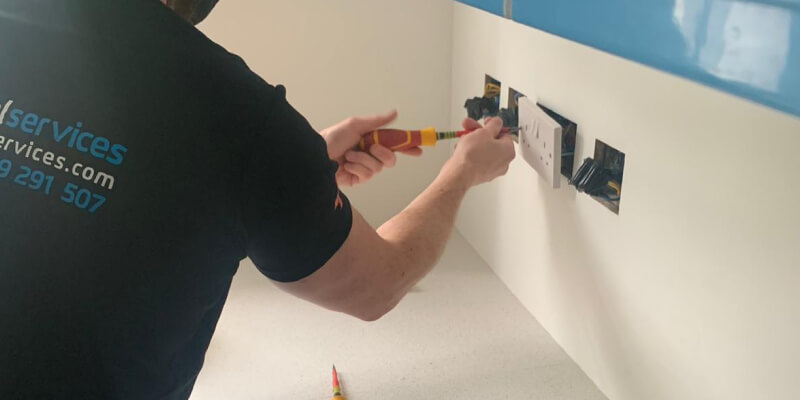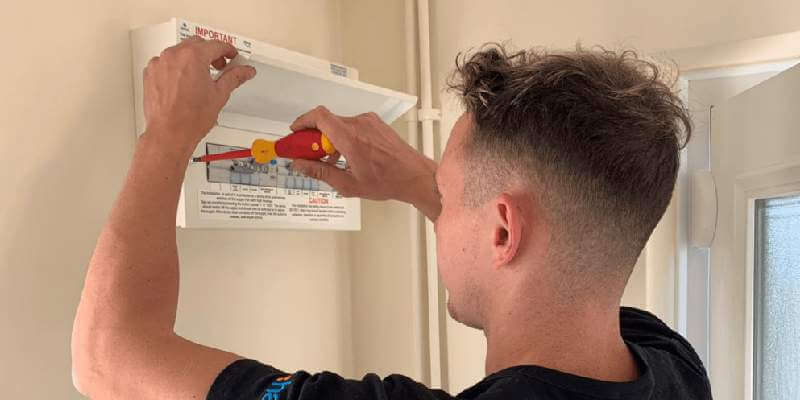When moving into a new home, it feels like there are many jobs to keep in mind, from packing up your property to transporting your belongings from A to B. However, one aspect that is essential yet is often missed is making gas and electricity arrangements. Setting up gas and electricity in a new home in the UK needn’t be tedious; to make the transition even easier, we’ve put together a guide on everything you need to know!
A guide to setting up gas and electricity in a new home UK
When moving into a new home, any potential saving makes a difference, so putting aside some time to organise your gas and electricity plan will always work towards your advantage. Whether you opt for switching providers ready for your move or if you need to schedule new installations once you have settled in, most jobs can be closed off in advance, making your big move just that little less stressful.
As reputable domestic and commercial electricians in Milton Keynes, our certified engineers regularly work closely with clients during their move, ensuring that every component of their new home is up and running as it should be. We are always more than happy to answer any questions you may have regarding your installations and appliances, so please do not hesitate to get in touch.
In the meantime, if your move is coming up and you’re not too sure where to start, take a look at our handy checklists:

Checklist for your new home gas and electric
To ensure that you are not faced with unexpected expenses or settle in to find problems with your new home’s gas and electricity, be sure to tick off all of the tasks listed below!
Before the move:
1. Contact your existing provider
Firstly, you will need to contact your existing provider/s to let them know that you are moving house. This should be done at least 48 hours before the day of the move (the more in advance, the better).
During the call, they will ask you whether you want to keep them as your provider or cancel your current plan. We’d recommend spending time ahead of your call researching different suppliers to determine whether you would benefit from switching. If you do decide to leave, be aware that there might be an early exit fee.
2. Find out who your new supplier is
Along with arranging your gas and electricity supply, you would also benefit from finding out who is the supplier for your new home. The easiest option will be to ask the current owners, tenants or landlord. From here, you can get in touch with the supplier and make any necessary arrangements.
If you cannot get hold of this information, then you can find it yourself through the following:
- Gas: Call the Meter Number Helpline on 0870 608 1524 or visit Find My Supplier.
- Electricity: Take a look at comparethemarket to find the contact details of the local distribution centre for your area; they will be able to tell you who is your electricity supplier.

During the move:
1. Take meter readings
On the day of your move, don’t forget to take a meter reading before leaving the property and pass this on to your supplier. This ensures that your bill is accurate and you are not charged for any power used by the new occupants.
If you have opted to leave your old supplier, then you will be provided with your final bill after you have passed over this information. The bill will also include any additional fees discussed, such as your exit fee.
Once you have arrived at your new home, also take a reading of your new meter to ensure that your first bill is correct.
2. Top up your prepayment meter (if applicable)
If your new home has a pay-as-you-go meter, it is recommended to top this up as soon as you arrive at the property; this is most common on rental properties. You will be provided with a smart key or card, which must be topped up with credit.
Before making any payments, always double-check that the previous tenants have paid any outstanding debts, so you do not have any extra charges.
3. Locate the fuse box and trip switch
To ensure that you are prepared in the event of a power cut, spend time locating the fuse box and trip switch. These will always be within three meters of your electricity meter, usually underneath the stairs or in the garage. Although this may not appear to be an important job during your move-in, you’ll most definitely thank yourself should the electricity cut out unexpectantly.
If you have recently moved into your new home and have found that the power keeps tripping, then our electricians in Milton Keynes have put together a handy guide on what to do. Click here to find out more.
After the move:
1. Find out your meter numbers
Your electricity and gas meters each have a supply number that is unique to your property. It is beneficial to note these down as you will need them when setting up new accounts with suppliers. These supply numbers are as follows:
- Meter Point Reference Number (MPRN): This is between 6 and 10 digits. If you have an existing energy bill, it’ll be printed here, but if not, you can request for it to be sent to you via the Meter Point Administration Service.
- Meter Point Administration Number (MPAN): As a 21 digit long number, this can sometimes be referred to ask a ‘supply number’. It will also be on your energy bills, but if you don’t have this, you’ll need to contact the supplier directly.
2. Contact your new supplier if you are yet to switch
If you are yet to arrange an energy plan for your new home, aim to do this as soon as possible after moving in. Failing to do this may mean that you are automatically put on the suppliers’ standard variable tariff, which will result in paying far more than necessary. The standard variable tariff is the simplest option available yet tends to be the most expensive, so you will most definitely be able to negotiate a more cost-effective alternative. Find out more about standard variable tariffs on Money.
3. Update an outdated central heating system
After moving into a new property, many homeowners slowly begin to update old installations that are proving inefficient. However, if you notice that your central heating is playing up, this should always be the priority.
At Heath Electrical Services, we offer a range of heating services in Milton Keynes, all completed by registered Gas Safe engineers. Should you need to replace the boiler in your new home, we would be more than happy to arrange a visit to assess the condition of the system and give a quote. Our engineers have experience working on a number of heating types, from electric and natural gas to oil heating, along with providing annual servicing to keep your boiler in full working order. Please do not hesitate to get in touch to discuss your property further.
4. Don’t forget to check your plumbing system
Although plumbing does not technically fall under the gas and electricity category, your central heating, in particular, requires a functional plumbing system in order to continue running.
If you have moved into your new home and noticed issues with any aspect of your plumbing, it is highly recommended to contact a professional quickly. This prevents the problem from growing and, therefore, becomes most costly to repair or replace.
Along with electricity and heating, our team can also assist with plumbing in Milton Keynes, allowing you to complete all work on your new home under one roof. Our accredited plumbers can not only cover kitchen, bathroom and appliance installation but also vented and unvented cylinder repair and replacement. We’re always just a phone call away if you need our help!

FAQs on setting up electricity in a new home
When working with clients to set up their new home, there are particular questions that we are regularly asked, so we have put together the most common, along with their answers, below:
How do I set up gas and electricity in a new build?
Typically, the property developer would have already set up the gas and electricity for the property, but it is your choice whether you stick with this supplier. It is always beneficial to shop around and get a few different quotes to see if you are able to find a more cost-effective plan. If you decide not to switch, ensure that you have all of the details of the supplier you have been set up with, so you can easily contact them if needed.
Who should complete electrical installations in new homes?
To ensure that all electrical work complies with Part P of the building regulations, it is important to familiarise yourself with what tasks you can complete through DIY methods and those that require a certified electrician.
Based on the regulations, the only works that can be completed without an electrician are replacements, minor repairs or “like for like” updates. Aside from these, all other electrical installations in new homes must be closed off by registered electricians, as they will be able to provide you with an electrical safety certificate.
What are the things to consider when wiring a new house?
If you are moving into an older home, your survey may state that the property needs to be rewired. This is essential to ensure that your property remains in line with the latest regulations and you are not exposed to electrical dangers. Rewiring must be completed by a registered electrician as the process involves lifting flooring, drilling into walls and replacing cables, circuits and more. Our professional electricians in Leighton Buzzard are the best route to take for this job; their wealth of knowledge is perfect when it comes to helping you sort out your electricity and wiring after moving into a new home!
Due to the complexity of this project, it is first important to consider whether you would benefit from rewiring before moving in. Rewiring an empty property is far more straightforward for both you and your electrician. Living inside a home that is being rewired means that power will be turned off for quite some time each day, and certain rooms will not be usable for the duration.
Other things to consider when wiring a new house are how many sockets, circuits and connections you would like, along with where you want outlets to be located. For a full guide to rewiring a house, take a look at our previous article.

Making the moving-in process as stress-free as possible!
Moving into a new home, whether it is your first time or you are an experienced homeowner, is always a daunting thought. However, with plenty of planning and preparation, the process can be made far more straightforward and, most importantly, less stressful. Setting up your gas and electricity is one of the easiest jobs to get out of the way in advance, meaning that only a few tasks will be left over on your move-in date. If you need any help with your electricity, gas or plumbing, our team are always more than happy to help, so make sure to contact us now!












